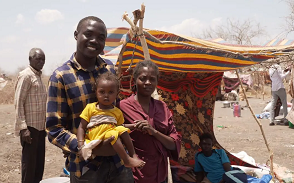BY YANET FANTAYE WOGAYEHU – The economy of South Sudan is being challenged by the damages to the pipeline that carries 70 percent of it’s oil production through Sudan, and by the influx of massive refugees from the neighboring country – Sudan, says the IMF.
The challenges have “led to a sharp decline in oil exports and lower foreign exchange inflows, a large exchange rate depreciation in the parallel market, sharp fiscal revenue drop leading to the accumulation of salary arrears, and high inflation. The war in Sudan has also led to a massive refugee inflow (over 800,000 as of mid October 2024) and a supply chain disruption (mainly imports of fuel and key food staples),” said the International Monetary Fund (IMF) in its latest statement that followed discussions on Third and Final Review of South Sudan’s Staff Monitored Program with Board Involvement (PMB).
“In addition, more than half of the population (about 7.1 million) is estimated to be experiencing acute food insecurity. The South Sudanese authorities face the challenging task of meeting higher spending needs, including on humanitarian relief, against the backdrop of limited financing options,” it said.
A UN agency report in October 2024 stated that the South Sudan situation remains one of Africa’s most significant refugee crises, with 2.3 million refugees and asylum-seekers in neighboring countries and a further 2 million South Sudanese internally displaced.
The IMF stated that a PMB was approved by IMF Management in February 2023 and subsequently extended to November 15, 2024 following a request by the authorities. “The program’s objectives are to support the authorities’ reform agenda aimed at maintaining macroeconomic stability and debt sustainability and improving governance and transparency with the objective of building a track record in support of the authorities’ request for a financing arrangement under the Extended Credit Facility (ECF).”
Since its independence in 2011, the country has suffered from severe droughts (2011, 2015) and floods (2014, 2017, 2019, 2020, 2021, 2022, and 2024), resulting in high numbers of fatalities, displacements and loss of livestock which have severely impacted people’s livelihoods. As of September 2024, a new web of flooding has affected more than 735,000 people across 38 of 78 counties in South Sudan, worsening an already critical humanitarian situation marked by severe food insecurity, economic decline, continued conflict, disease outbreaks, and the repercussions of the Sudan conflict.
South Sudan remains in a serious humanitarian crisis, according to the World Bank. “An estimated 9 million people, including refugees in South Sudan, will experience critical needs in 2024. An estimated 7.1 million individuals of South Sudan’s total population of 12.4 million will require food assistance during the lean season from April to July 2024. Women and children continue to be the most affected. The humanitarian crisis has been further exacerbated by the recent conflict in neighboring Sudan, which has led to an inflow of refugees and returnees into South Sudan.”
The IMF stated that performance under the third review was mixed with two quantitative targets at end-June 2024 met (the zero ceiling on contracting non-concessional debt and the floor on net international reserves) out of five. The other quantitative targets at end-June 2024 related to salary payments, social spending execution, the primary deficit, debt to the central government, and reserve money growth were missed, partly because of the oil production shock. While the structural benchmarks were not implemented at end-June 2024, two out of three were completed subsequently.
“The Bank of South Sudan’ s 2021 audited statements were published in early September 2024 and the authorities formulated a salary arrears repayment plan under the FY2024/25 draft budget submitted to Parliament in September 2024. The authorities took steps toward hiring an international firm to audit the central bank’s financial statements of 2022−24,” it said.
It is stated that IMF’s team discussions with the authorities during the review focused on: (i) accelerating reforms and collection efforts to continue strengthening non-oil revenue and redirecting funding towards urgent social spending, including salary payments; (ii) continuing prudent borrowing and contained monetary financing, against the backdrop of financing pressures, to maintain economic stability and debt sustainability; (iii) further exchange rate management flexibility to reduce external imbalances and improve market functioning; and (iv) reforms to further strengthen governance and fight corruption, while improving public finance management.

